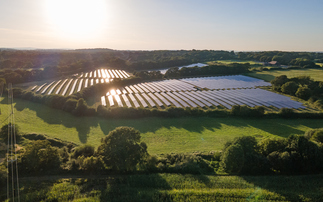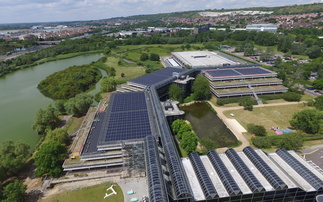Industry demands urgent clarification on nature and scale of prospective changes to subsidy regime
The solar industry has this morning responded angrily to fresh reports the government is planning to "slash" subsidies for solar farms.
As BusinesssGreen reported yesterday, the government is planning to launch a review of solar subsidies designed to support its recently launched Solar Strategy, which aims to favour large scale rooftop installations over ground-mounted solar farms.
Sources confirmed that a review was imminent and hinted that it was likely to curb support for solar farms following a flurry of new developments in recent months. But they refused to be drawn on the precise scale, nature and timing of any changes to current solar subsidy regimes.
However, the Daily Mail has today reported that the proposed review will mean that "huge solar farms which blight the countryside are to have their funding slashed by the government".
The report, which makes no mention of a new survey that this week showed that over 80 per cent of people support solar power, adds that Climate Minister Greg Barker "wants to take support payments away from the unpopular large solar farms, the majority of which are built on farmland in southern England".
The report brought an angry response from across the solar industry, with developers accusing the government of once again undermining investor confidence.
"Solarcentury and many others in the solar industry, including the Solar Trade Association (STA), have been calling on DECC for several months to provide crystal clear clarity on the Renewables Obligation and to confirm that publicly," said Seb Berry, head of public affairs at leading developer Solarcentury. "We were promised 'certainty' privately as recently as two weeks ago, but such welcome assurances are now at odds with the anonymous public briefing from an unnamed Conservative source quoted by the Daily Mail."
The industry is particularly concerned that any changes to subsidies could be rushed through this year, dealing a major blow to projects that are already in the pipeline. "It goes without saying that any move to change the RO from 2015 will have significant commercial consequences for this sector because of the long time-frame for large-scale projects," said Berry. "The truly nightmare scenario of a possible change to the RO before April 2015 would be a commercial disaster for the entire industry and certainly open up DECC to the prospect of legal challenge. We have already asked DECC whether this 'imminent' review is going to provide transparent certainty and reassurance on this most important of issues. It must now do so."
He added that the absence of detailed information on the nature of the proposed consultation was having a chilling effect on the industry. "We are still dealing with Conservative 'source' rumours, nods and winks aided and abetted by the Daily Mail, so it's hard to know what we can expect when this review is finally published," Berry said. "Given the public media speculation prompted by a government 'source', it's essential now that the Secretary of State acts urgently today to reassure investors and to confirm that the RO will be left alone."
His comments were echoed by Nick Boyle, chief executive of Lightsource Renewable Energy, who said that instead of being congratulated for delivering much-needed new clean energy capacity in recent months the solar industry was once again "having to justify our very existence".
"Solar installations are an asset to Britain and should be held up as a beacon of home-grown electricity generation, but constant tariff cuts and government pressure act to undermine the work we do to provide clean, secure energy and put into serious question the very momentum we have worked so hard to build," he said. "Solar is adding genuine new electricity generation to the UK, something the government can ill-afford to ignore."
Bruce Davis, co-founder and managing director of crowd-funding platform Abundance, which supports a number of solar projects, said the latest attack on solar farms was further evidence of the Conservative Party's reluctance to support disruptive and popular clean technologies.
"Tory energy policy is designed for the few, not the many," he said. "It's not hard to see a move to reduce the deployment of solar is out of step with the wishes of the majority, 80 per cent of Brits want more solar power according to DECC's own survey this month... Simply, government intervention can only go so far in redressing the balance of power in any market. The main thing it can do is to create a level playing field and stability for challengers to compete against the incumbents. This means that renewable energy should be treated as a priority planning decision, and energy policy should be made in the interests of the country as a whole, not just to appease the reactionary right wing of a party."
However, government sources maintain that solar subsidies need to be reviewed in order to address concerns that the recent surge in new solar farm developments will eat into the available budget for clean energy projects. They have also warned that a shift from solar farm development towards installations on the rooftops of factories, warehouses, supermarkets, and public buildings will help the solar industry avoid the local opposition to new projects faced by some wind farm developers.









